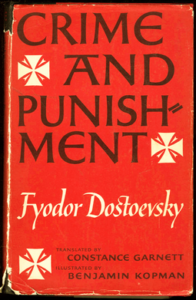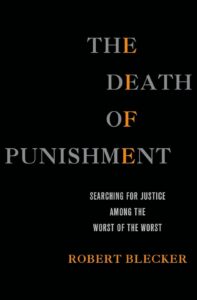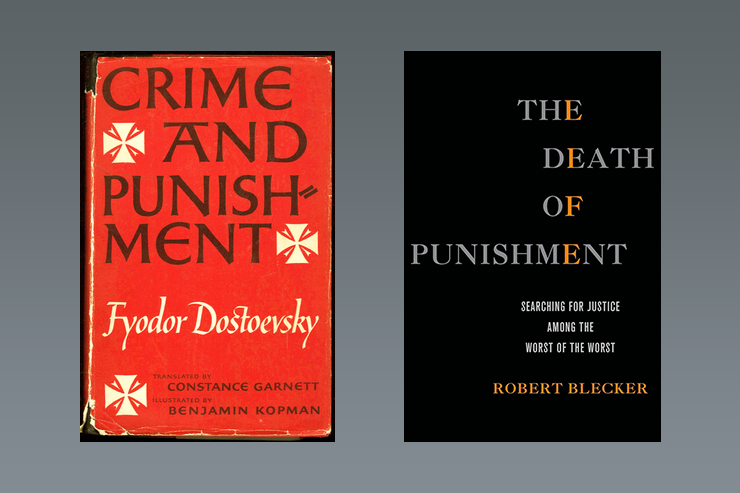
Fyodor Dostoevsky is no theologian sensu stricto, yet the constant theme of both Crime and Punishment and The Brothers Karamazov is the bond between man and God. I have reread the former recently, after an interval of some 50 years, and to great profit. As a teen, I was frustrated by the narrative, which consists of little action and a lot of thoughts. Now I am better able to appreciate those thoughts, grandiose at first and full of anguish and despair later.
Rodion Raskolnikov, a failed law student living in extreme poverty, becomes obsessed with the idea of killing a greedy old pawnbroker. Raskolnikov is an intelligent and insightful young man, generous and sensitive, but he does not accept the human condition. He cannot bear the injustices of this world embodied in the despicable old hag. He robs and kills her (along with her half sister as collateral damage) but not for money. He acts out of conviction rather than necessity. Since there are persons whose existence makes the world worse, it is legitimate that they be eliminated for the good of all. He who has the courage to carry out such an act will assert his “Napoleonic” nature, which allows him to move beyond the norms of good and evil.
Raskolnikov’s experiment fails. As soon as the deed is done, he is seized by a paralyzing sense of guilt and anguish, by utter despair and a delirium of fever, by sleepless nights and unbearable days, while the investigating judge weaves a subtle net around him. Eventually Sonya, an angelic figure forced by her stepmother into prostitution, saves him with the Gospel story of Lazarus. The possibility of redemption leads Raskolnikov to confess and accept the law common to all men. Ultimately he opens himself up to a new life by accepting the cross offered by Sonya, who has followed him to Siberia.
Raskolnikov’s sin is in rejecting God and believing that his reason can solve the dilemma of his existence. It is also the fatal error of Ivan Karamazov and of the conspirators in Dostoevsky’s novel Demons. By rejecting God, the principle of the human person’s supreme value is negated, which leads to the destruction of life itself.
The contrast between the Promethean idée fixe and the gift of the cross is more starkly presented today than when Dostoevsky wrote his masterpiece 160 years ago. Denying the grace of God, today’s Western man is condemned to the prison of himself as an end in itself. He may invent and reinvent himself on a daily basis; he may change his gender and sexual orientation as often as he washes his body, but his eternal becoming comes at the price of not being. Dostoevsky would be horrified by what we are doing to ourselves, but he would understand.
—Srdja Trifkovic

Robert Blecker, a law professor emeritus at New York Law School, has spent a great deal of time reflecting on capital punishment. In his book, The Death of Punishment, and in the documentary film, Robert Blecker Wants Me Dead, he has produced a testament at once to the humanity of even brutal murderers and to the moral legitimacy of taking some of their lives as the price of their monstrous deeds.
Blecker is a retributivist. The goal of punishment in this framework is not deterrence, nor is it the rehabilitation of the criminal. Punishment has as its charge, according to Adam Smith in his Theory of Moral Sentiments, to “fully gratify” the resentment and anger we feel toward the offender. Blecker quotes from Smith when he writes that we must “oppose to the emotions of compassion which we feel for a particular person, a more enlarged compassion which we feel for mankind.”
Blecker’s book and the documentary both use the case of Daryl Holton as example of the kind of offense that merits the death penalty. Holton used a semi-automatic rifle to murder all three of his young children and their half sister, ages four to 12, claiming he did it to save them from the underclass life they were leading in the chaotic home of his ex-wife. He had also planned to kill his ex-wife and himself but did not follow through with that part of his plan.
Blecker spent many hours conversing with Holton on death row about his crime. Though he found Holton to be a complex individual with some admirable traits, Blecker remained unshaken in his retributivist conviction that Holton deserved to die for the dreadful thing he had done.
The book also recounts the dispute between the Western powers and the Soviets concerning the fate of Hitler’s Deputy Führer, Rudolf Hess. Aged and feeble, Hess languished in prison. The Western allies believed he deserved compassionate release. The Soviet response was this: “We remember everything about the past … Is it necessary to be merciful to one of those who wanted to drown humanity in blood?” Blecker notes that this was the first time he had believed the Soviets to be correct in their position against the West: “The past counts. How many times I would shout that, if only they’d let me, and you’d listen. The past counts. Not rationally, but really. The past counts.”
—Alexander Riley

Leave a Reply